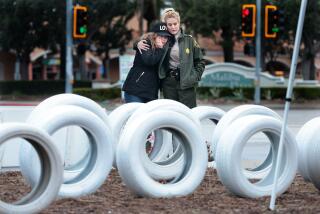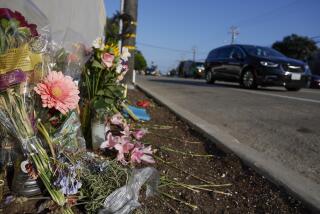State Proposal to Ease Congestion : Beach Cities Block Road of PCH Traffic Plan
State efforts to ease congestion during the evening rush hour on Pacific Coast Highway in Hermosa Beach and Redondo Beach have come to a standstill because of opposition to suggested parking restrictions on the crowded thoroughfare, according to the state Department of Transportation.
Caltrans associate traffic engineer Ed Nahabedian, who oversees operations on the state highway, said in an interview last week that lack of cooperation among the beach cities has left Caltrans with no choice but to wait for officials in Hermosa Beach and Redondo Beach “to come to their senses one of these days.”
State officials say the key to improved traffic flow on the highway lies with Hermosa Beach, where elected officials have repeatedly balked at proposals by Caltrans to restrict parking in the southbound direction. Currently, three lanes of evening rush-hour traffic heading south from Manhattan Beach, where parking restrictions do exist, create a messy vehicular funnel at Longfellow Avenue, where the two cities meet.
“I have just given up,” Nahabedian said. “We have done everything possible in the books to cooperate with them. I am not going to do anything until they come to me.”
At a meeting week before last in Hermosa Beach, Gary Bork, Clatrans chief of traffic operations, told a group of merchants and residents that the state has done all it will do “until we get consent from the community.”
Hermosa Beach officials say parking restrictions, which would create a three-lane highway in their city during the evening rush hour, would run merchants out of business and transform the road into a high-speed thoroughfare. Officials in Redondo Beach say it is foolish to impose parking restrictions in that city as long as Hermosa Beach refuses to do the same.
“Pacific Coast Highway is our major commercial street,” said Hermosa Beach Mayor Jack Wood, who was elected in 1982 on a platform opposing parking restrictions on the highway. “The restrictions would totally disrupt the economy of our city. If people can’t park, obviously they aren’t going to patronize our businesses.”
Said George Priamos, who has operated Priamos Florist on the highway since 1940: “They want to take away our best shopping time. They’d be taking money out of merchants’ pockets for a freeway.”
For years, Caltrans has proposed that Manhattan Beach, Hermosa Beach and Redondo Beach restrict parking on the west side of the highway during evening peak hours. On most stretches of the highway, the restrictions would open a third lane to motorists commuting between aerospace industries in El Segundo and their homes in south Torrance, Redondo Beach and on the Palos Verdes Peninsula.
In the early 1970s, Manhattan Beach banned rush-hour parking on the west side of the highway, and last month, the city agreed to extend the restriction by nearly two hours, making parking illegal between 3 and 7 p.m. In August, the City Council also approved a long-term plan to widen the highway, which is called Sepulveda Boulevard in Manhattan Beach and El Segundo, by requiring new developments to be set back 12 feet.
But Hermosa Beach and Redondo Beach have made no effort to follow suit, despite studies by Caltrans showing that restrictions in Manhattan Beach alone will not alleviate the congestion. Caltrans estimates that 56,000 cars pass through portions of the highway in Hermosa Beach every day. The highway was designed to accommodate about half as many cars.
Nahabedian said much of the problem results from a lack of cooperation among the three beach cities in traffic management and planning. Officials in Redondo Beach, for example, have been unwilling to impose parking restrictions in their city in part because of the recalcitrance of officials in Hermosa Beach, their neighbor to the north.
“Unless they do it in Hermosa, it won’t do much good to do it Redondo,” said Redondo City Engineer John Held. “Our traffic isn’t as bad as it is in the north.”
Officials at Caltrans agree that Hermosa Beach is the most important link in the congestion chain, and, accordingly, they have concentrated most of their efforts there. At the meeting week before last at the Hermosa Beach Community Center, Bork emphasized that parking on Pacific Coast Highway in Hermosa Beach has economic repercussions beyond those mentioned by local businesses. He said the 66 parking spaces on the west side of the highway are costing commuters $530,000 a year.
That figure is based on the cost of accidents and the value of time lost to motorists during lengthy commutes on the highway, said Bork, who spoke at the request of Assemblyman Gerald N. Felando (R-San Pedro), who represents the beach cities.
Caltrans estimates that southbound traffic travels through Hermosa Beach at 11 miles per hour during evening rush hours. In contrast, traffic travels at about 35 miles per hour during morning rush hours in the northbound lanes, according to the estimates. Hermosa restricts parking on the east side of the highway during morning rush hours when most local businesses are closed, and Caltrans attributes the faster speeds to those restrictions.
Bork said parking on the west side of the highway during rush hour is also forcing commuters to leave Pacific Coast Highway in search of faster routes--which inevitably leads them to residential streets, he said.
The “spillover,” as it is called, creates a safety hazard in residential neighborhoods, contributes to noise and air pollution and decreases the value of homes in those areas, he said.
But while residents in neighborhoods adjacent to the highway--particularly those on Gould Avenue and 27th Street--agree that the spillover is an intolerable nuisance, Hermosa Beach merchants complain that the parking restrictions are too severe. Merchants are of the same opinion in Manhattan Beach, where the City Council imposed restrictions despite protests from the business community, and Redondo Beach, where no parking restrictions exist on either side of the highway.
“We feel the traffic is not that bad,” said Guy Raffaele, owner of Gemini Jewelers on Sepulveda in Manhattan Beach, and a resident of Redondo Beach. “The more highway you build, the more traffic you are going to get.”
Priamos, the florist, said he and other beach-city merchants along the highway hope to organize a Pacific Coast Highway business association in an effort to show local and state officials that opposition to parking restrictions transcends city borders.
Caltrans has pledged that it will not eliminate on-street parking on Pacific Coast Highway without helping to provide off-street parking elsewhere to compensate for the loss. Bork suggested at the meeting that several small parking lots could be built in Hermosa Beach along the highway. Nahabedian said federal funds are available for such projects.
Mayor Wood said he and others in Hermosa Beach favor providing off-street parking for merchants. He said the city has considered creating a parking assessment district for the highway, and said the City Council now requires new developments along the highway to include adequate parking off the highway. But, he said, the problem does not end there.
“The bigger question is whether the city of Hermosa Beach’s best interests are served with a high-speed arterial highway passing through it with limited ability to turn off,” he said. “The solution for getting people home to ‘the Hill’ is to build a limited access road.”
Wood said three lanes of swiftly moving traffic through Hermosa Beach each evening, while appealing to Peninsula residents eager to get home, simply would not serve the best interests of his city. A community-oriented commercial road, with easy access and abundant parking, would be preferable, he said.
Officials at Caltrans say that the state has the legal right to impose restrictions on cities if traffic congestion becomes a safety hazard. Caltrans has been reluctant to do that, however, and both Bork and Nahabedian said that is not considered an option in Hermosa Beach.
A solution imposed by Caltrans could create enforcement problems because local city councils could choose not to enforce the restrictions. Since Caltrans has traditionally been unwilling to request assistance from the California Highway Patrol in enforcing parking restrictions, local cooperation would be imperative.
The recent decision in Manhattan Beach to extend parking restrictions, however, has created some hope at Caltrans that the beach cities eventually may act on their own when congestion becomes unbearable.
More to Read
Sign up for Essential California
The most important California stories and recommendations in your inbox every morning.
You may occasionally receive promotional content from the Los Angeles Times.










